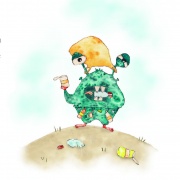One night, Jay woke up and saw a bright light in the sky. Something was flying extremely fast towards the window. Suddenly, it stopped. A door slid open, and a funny looking creature got out. “Arp! Hello, my name is Goggles. Arp,” the creature said. Jay just stared. “Arp! Can you hear me? Do you know how to talk? Arp!” Goggles asked. Jay tried to talk but no sound came out. “Arp! Can you tell me what – arp! – these are?” Goggles held up a plastic bag, a plastic bottle and an empty tin.
“They are growing all over Earth. They are on the land and in the rivers and floating in the sea. Are they good to eat?” The creature tried to take a bite out of the bottle. “No, don’t eat that! It’s plastic!” Jay’s voice was loud and clear again. “People drop their rubbish in the streets, and it blows into the rivers and floats down to the sea. Sometimes hungry fish and turtles think it’s food, and they eat it and die. Plastic and glass and tin last a long, long time, so the land and the rivers and the sea and the beaches are full of rubbish.” Goggles looked sad. “What if … arp! … what if I beam all the litter into space?

I’ll make a new planet for me to live on and Earth can be clean again and the fish won’t eat the plastic. Arp! Is that a good idea?” “Sure,” Jay said. Goggles jumped back into the spaceship. “Arp! If you need me, shout my name three times,” Goggles called as the spaceship moved away. Jay watched the spaceship rise higher and higher. It was beaming up litter off the streets, out of the rivers, off the beaches and out of the sea. The next day, everyone woke up to a bright, shiny new Earth.
No litter anywhere. Clean water, clean streets, clean everything. Everyone loved Clean Earth. Earth beautiful. They will feel so happy in their dreams that they will want to carry on doing those things when they wake up. Arp.” And that’s just what happened. Goggles sent golden dream dust floating and flying around the world. That night, millions and millions of people dreamed they were doing things to care for the forests and fields and mountains and rivers and beaches and seas.
They felt happy and peaceful in their dreams. And when they woke up, they went off and did exactly what they had been dreaming about. They made Earth beautiful again. But nobody changed how they lived. They still threw their rubbish into the streets. In a very short time indeed, the streets and the rivers and the beaches looked just as bad as before. Jay decided to call Goggles for help. “Goggles, Goggles, Goggles! Earth is in trouble again!” ZAP! The spaceship appeared. “Arp! This time I’m going to try my dream dust,” Goggles told Jay. “Everyone on Earth will dream that they are picking up rubbish, arp! and planting trees, arp! and recycling, arp! and doing all the things that help keep
Nal’ibali fun
Ideas to talk about
What does littering do to our environment? What can you do to take care of your environment?
Visual
Draw a picture to show what you think the golden dream dust looked like when it was flying all over the world.
Reading
Re-read the paragraph in which Jay explains how rubbish lands up in our rivers and seas, and on our beaches. Create a diagram to show how this happens. Draw small, labelled pictures and arrows between the pictures.
Writing
Write a newspaper article about the different ways in which Goggles helped to make Earth beautiful again. Don’t forget to give the article a catchy title! Draw picture to go with it.
Craft
Reuse materials like tins, plastic jars and cardboard boxes that often get thrown away. Decorate them using paper, glitter, paint and/or crayons to make things that you and other family members can use, like pencil holders, vases and storage containers. Make a poster with one or two practical ideas on how we can take care of the environment.

